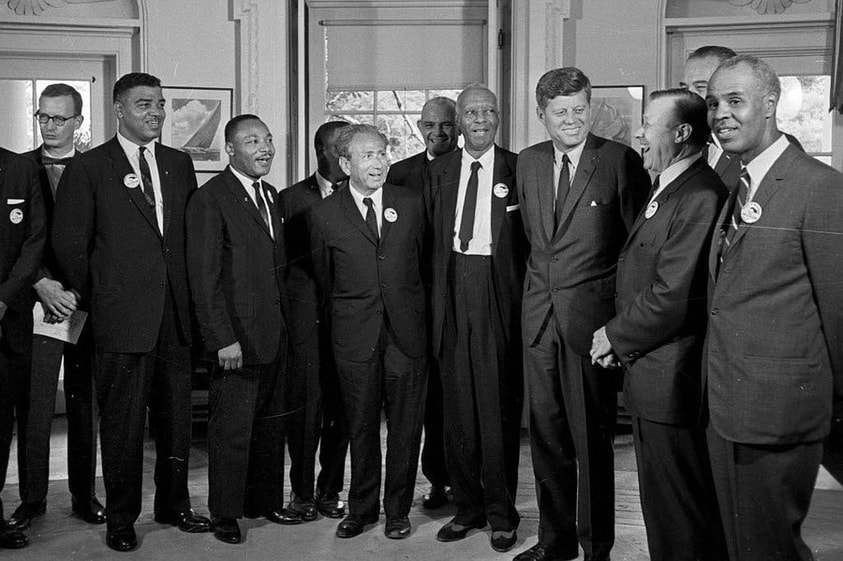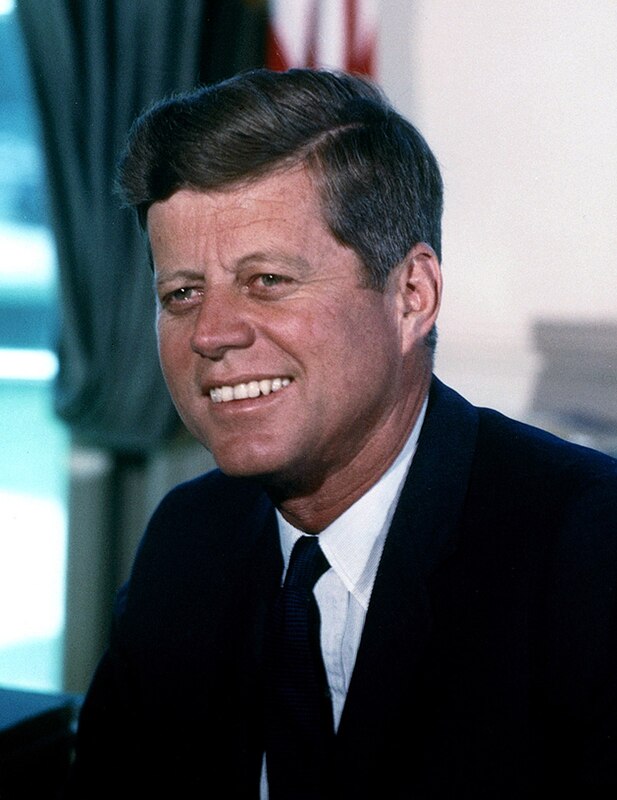Think of a time period in which a place is changing by the very second, and with that change there is fear in near almost every citizens head. No need to imagine anymore this place in time is the 1960’s in The United States. The 1960’s would become known as a time period in which challenged the ideas of those before. With this change and fear America would need a prominent leader. That man fit for the job was John F Kennedy. Kennedy came into leadership in a time where America was facing many problems. One of the biggest problems was that of the Civil Rights. When Campaigning JFk defined the fight for civil rights as something that was moral and necessary. However through the release of Mlk, JFk was really trying to boost his votes.
To some degree we can see that Kennedy did believe the Civil rights issue to be something moral. In an interview in 1960 he had this to say “Deep in America, because your skin is dark, you cannot eat lunch in a restaurant open to the public. If he cannot send his children to the best public school available, if he cannot vote for the public officials who represent him, if, in short, he cannot enjoy the full and free life which all of us want than - then who among us can be content to have the color of his skin changed and stand in his place? Who among us would then be content with the counsels of patience and delay?”. (Kennedy NPC) Through this quote we can see how Kennedy thought the problem was moral. However during his campaign Kennedy would do more to talk about the issue of the cold war. To become president Kennedy had to be a cold warrior.
To some degree we can see that Kennedy did believe the Civil rights issue to be something moral. In an interview in 1960 he had this to say “Deep in America, because your skin is dark, you cannot eat lunch in a restaurant open to the public. If he cannot send his children to the best public school available, if he cannot vote for the public officials who represent him, if, in short, he cannot enjoy the full and free life which all of us want than - then who among us can be content to have the color of his skin changed and stand in his place? Who among us would then be content with the counsels of patience and delay?”. (Kennedy NPC) Through this quote we can see how Kennedy thought the problem was moral. However during his campaign Kennedy would do more to talk about the issue of the cold war. To become president Kennedy had to be a cold warrior.
On October 19th, 1960 Dr Martin Luther King Jr would be arrested along with 51 others in Atlanta, Georgia after refusing to leave their seats at a department store lunch counter. Dr. King did not lead this protest however he was the highest profile member of the group. King would be held on charges of that his arrest violated a term of state probation imposed earlier that year. (Back Then History). This arrest would outrage many Black within the whole country. Even a small population of whites would be outraged by this outcome. Through this arrest of the face of the movement those looking for there rights again saw there aspirations begin to perish. On that same Wednesday morning he was arrested senator John F Kennedy would phone the governor of Georgia. Some quiet, back-channel way had to be found to free the civil rights leader. Kennedy was motivated by his outrage, by his sympathy for the King family, and by bald political calculation. Kennedy had to walk a fine line here. He had to be careful not to outrage the white community by showing such large support for the face of the Civil Rights movement. However from this Kennedy would win a large amount of the African American vote. Perhaps responsible for the thin margin of victory Kennedy would have over Richard Nixon.
Through his actions with MLk it may seem like Kennedy truly was acting for Civil rights however other examples can show us differently. After the Democratic National convention Kennedy would meet with southern leaders trying to build his relationship with them and allay fears that he would be an aggressive civil rights president. When meeting with Georgia governor, Ernest Vandiver, Kennedy promised that as president he would never use Federal troops to force Georgia to desegregate its schools. (Kennedy Foundation). In return, Vandiver declared his preference for the senator and vowed to lead Georgia into the Kennedy column on Election Day. From this we can see that Kennedy was indeed concerned with his votes and becoming the president.
Through his actions with MLk it may seem like Kennedy truly was acting for Civil rights however other examples can show us differently. After the Democratic National convention Kennedy would meet with southern leaders trying to build his relationship with them and allay fears that he would be an aggressive civil rights president. When meeting with Georgia governor, Ernest Vandiver, Kennedy promised that as president he would never use Federal troops to force Georgia to desegregate its schools. (Kennedy Foundation). In return, Vandiver declared his preference for the senator and vowed to lead Georgia into the Kennedy column on Election Day. From this we can see that Kennedy was indeed concerned with his votes and becoming the president.
Before Kennedy made the decision to call and ask for the release of Mlk he was still concerned with the votes. Originally one of Kennedy's advisers came to him with the idea. When Ken O'Donnell pulled Kennedy aside to speak on the issue Kennedy had this to say “While I am sympathetic to what Mrs. King and her family must be going through, from a political point of view, all I can see is that it could backfire.” (Kennedy Time). Even though Kennedy decided to go through with the plan and free Mlk from this quote we can see he had doubts. And these doubts were primarily of fear of losing votes. From a letter Mlk would write to Jfk after his presidential victory we would see Mlk show support of the president. In the letter MLk would congratulate Jfk on his victory and show approval. However he would go on to say “ If it is possible, I would like to have a conference with you within the next three or four weeks to discuss some important matters concerning the civil rights issue.”( Mlk Letter)
In the end, Kennedy would do a lot to shape the country we have today. However being known as a strong civil rights leader would be incorrect. Kennedy did a lot to shape civil rights in the beginning however Kennedy was acting out of the basis of gaining votes. Kennedy would make calculated moves during his presidency acting for the basis of both sides. Again this would be shown by his movements towards civil rights.
Works Cited
Back Then History. blackthen.com/october-19-1960-martin-luther-king-arrested-in-atlanta-sit-in-protest-vide
"Jfk and Mlk." Npc, www.npr.org/templates/story/story.php?storyId=246334549. Interview.
Kennedy Foundation. www.jfklibrary.org/learn/about-jfk/jfk-in-history/civil-rights-movement.
Letter To JFK. Digital ed.
Morrison, Bryan W. Kennedy and King.
Time. time.com/4817240/martin-luther-king-john-kennedy-phone-call/.
In the end, Kennedy would do a lot to shape the country we have today. However being known as a strong civil rights leader would be incorrect. Kennedy did a lot to shape civil rights in the beginning however Kennedy was acting out of the basis of gaining votes. Kennedy would make calculated moves during his presidency acting for the basis of both sides. Again this would be shown by his movements towards civil rights.
Works Cited
Back Then History. blackthen.com/october-19-1960-martin-luther-king-arrested-in-atlanta-sit-in-protest-vide
"Jfk and Mlk." Npc, www.npr.org/templates/story/story.php?storyId=246334549. Interview.
Kennedy Foundation. www.jfklibrary.org/learn/about-jfk/jfk-in-history/civil-rights-movement.
Letter To JFK. Digital ed.
Morrison, Bryan W. Kennedy and King.
Time. time.com/4817240/martin-luther-king-john-kennedy-phone-call/.


